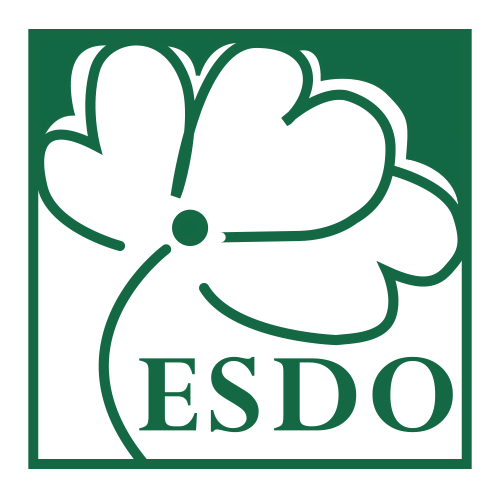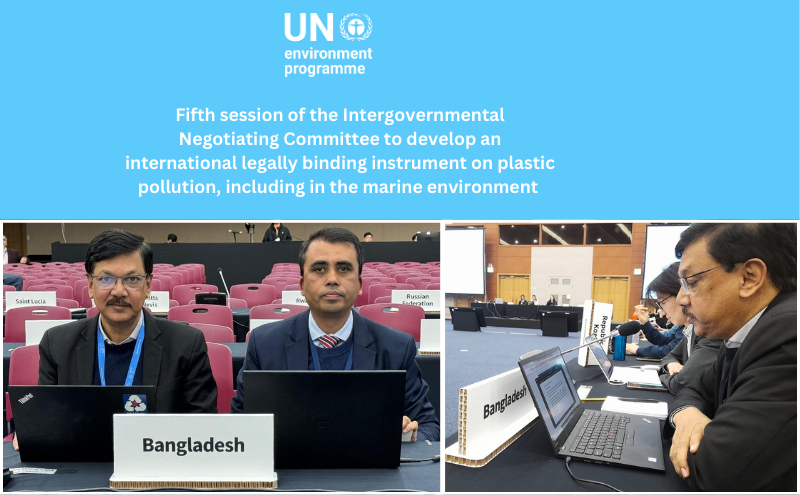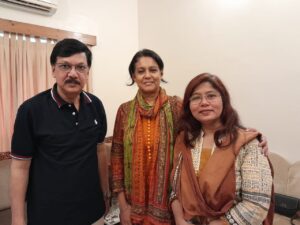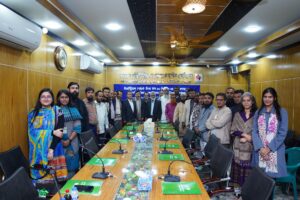The Fifth Session of the Intergovernmental Negotiating Committee (INC-5) for the Global Plastics Treaty, held in December 2024, marked a significant step forward in the global effort to tackle plastic pollution. Delegates, policymakers, experts, and civil society organizations gathered to negotiate the details of an ambitious treaty that aims to address the entire lifecycle of plastics.
The Environment and Social Development Organization (ESDO) actively participated in this historic session, representing Bangladesh as a key voice for developing countries. Our delegation, led by Ms. Siddika Sultana, Executive Director of ESDO, and Mr. Shahriar Hossain, Secretary-General of ESDO, played a crucial role in advocating for the inclusion of strong measures to combat plastic pollution, especially in low- and middle-income countries.
At INC-5, the global community demonstrated growing alignment on essential issues, such as adopting a life-cycle approach to plastics, phasing out hazardous chemicals, and curbing plastic production. However, notable divergences remain on financing mechanisms, just transition policies, and enforcement strategies. These outcomes underscore the urgency of a collective global response to address the plastic pollution crisis, which not only threatens human health but also devastates marine ecosystems worldwide.
ESDO’s Active Role at INC-5
Representing Bangladesh, the Environment and Social Development Organization (ESDO) emerged as a key advocate for a robust and inclusive treaty. Ms. Siddika Sultana, Executive Director of ESDO, and Mr. Shahriar Hossain, Secretary-General of ESDO, led the organization’s delegation, ensuring that the perspectives and priorities of developing nations were strongly represented throughout the negotiations.
ESDO’s interventions were focused on:
- Phasing Out Hazardous Chemicals and Plastics: ESDO called for global commitments to eliminate harmful chemicals and non-recyclable plastics, which disproportionately affect vulnerable communities and ecosystems.
- Ensuring Just Transitions for Waste Workers: The organization highlighted the critical need for just transition policies to protect the livelihoods of waste-pickers and workers in the informal sector, ensuring that they are not left behind in the transition to a zero-waste future.
- Strengthening Financial Mechanisms: ESDO emphasized the importance of financing mechanisms that support sustainable waste management in developing countries. Ms. Siddika Sultana urged negotiators to prioritize equitable resource allocation to enable low-income nations to effectively combat plastic pollution.
- Addressing Marine Plastic Pollution: ESDO drew attention to the devastating impacts of plastic pollution on marine ecosystems and coastal communities. The delegation called for binding global commitments to protect oceans and ensure the resilience of communities dependent on marine resources.
Amplifying Voices from the Global South
At INC-5, ESDO collaborated with civil society organizations from the Break Free From Plastic Network (BFFP) and other regional alliances to ensure that the treaty prioritizes the needs and realities of the Global South. ESDO’s contributions were instrumental in bringing attention to the challenges faced by nations like Bangladesh, which are disproportionately burdened by plastic waste from transboundary trade.
A Path Forward
INC-5 concluded with several promising developments, including a preliminary consensus on banning certain harmful plastic products and additives and commitments to enhance international cooperation on plastic waste management. However, there is still much work to be done before the treaty is finalized.
ESDO remains committed to contributing to this process, ensuring that the voices of vulnerable communities and developing nations are heard. As we look ahead to the next round of negotiations, we call on governments, industries, and individuals to join us in building a future free from plastic pollution.
Acknowledging ESDO’s Delegates
ESDO extends its gratitude to Ms. Siddika Sultana and Mr. Shahriar Hossain for their tireless efforts at INC-5. Their leadership and dedication have reinforced Bangladesh’s position as a global advocate for environmental sustainability and justice.
Let us continue to work together towards a cleaner, healthier planet. Stay tuned for updates on the Global Plastics Treaty and ESDO’s ongoing initiatives.



